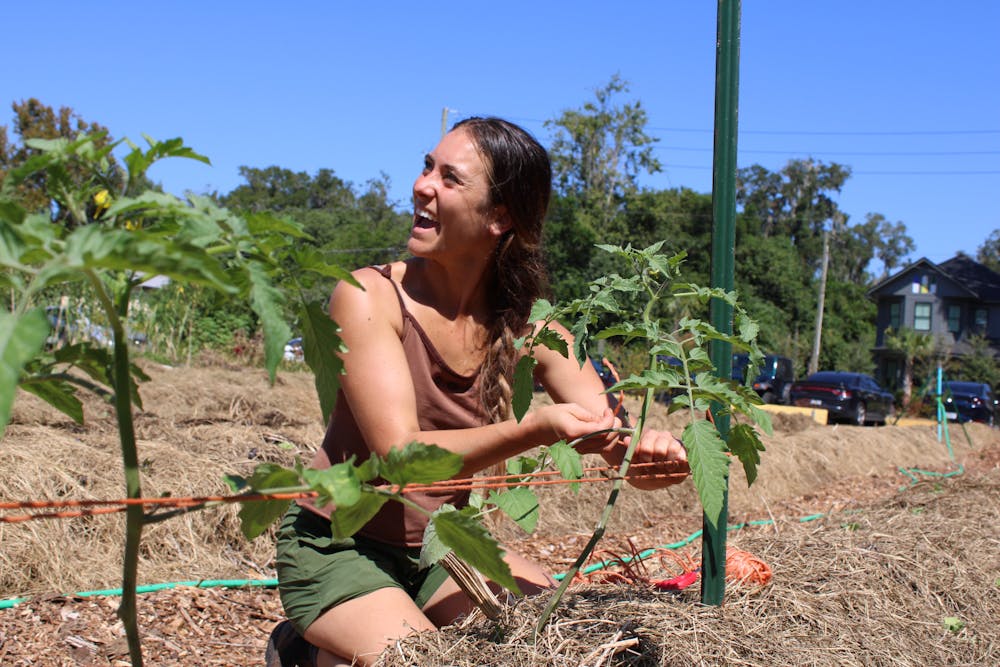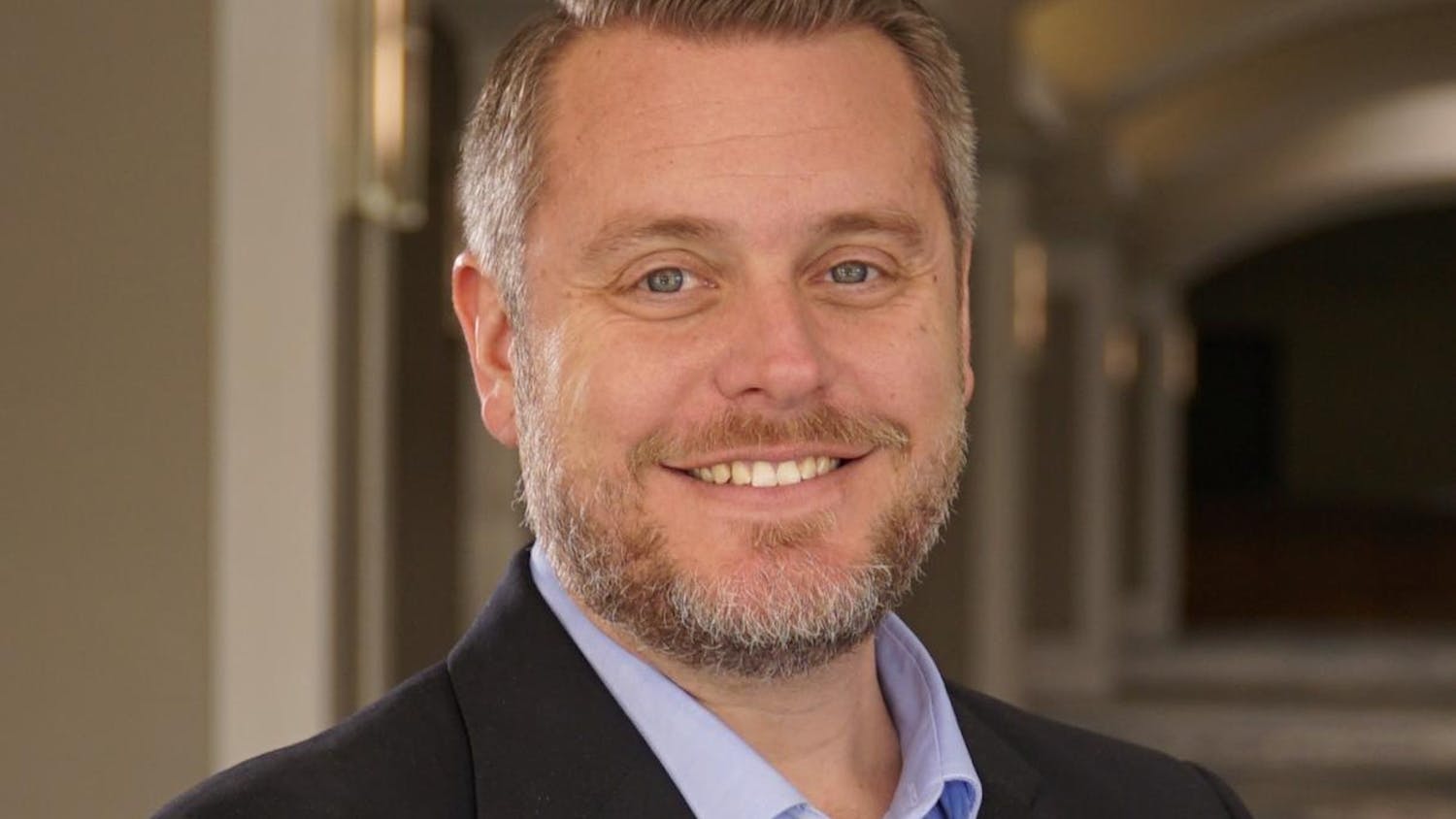Abigail Perret-Gentil, the founder of homeless shelter GRACE Marketplace’s community garden, watches the garden suffer from climate change. But she can’t protect the garden and the homeless shelter residents at the same time.
“[Weather] fluctuations are impacting the garden and the people who sleep outside,” Perret-Gentil said. “We really haven't grown a lot of tropical [plants] because we're at a shelter, and blankets are really important, and it doesn't feel right to cover plants with blankets and not people.”
Perret-Gentil preps the Grace Grows Garden, at 3055 NE 28th Drive, for intense climate changes by prioritizing low-risk plants like collard greens, she said. But she always prioritizes the residents first.
Community gardens, like the Grace Grows Garden, are green spaces in neighborhoods and towns for residents to grow their own plants and vegetables. These gardens can reduce urban heat islands, provide ecosystem services, increase stormwater retention and support food security, according to the National Socio-Environmental Synthesis Center.
But this community garden, and others in Florida, are facing similar problems resulting from climate change.
Climate change is threatening gardening across the country because of higher average temperatures and changing precipitation patterns, according to the National Wildlife Federation.
This past year, Florida experienced some of the hottest days ever recorded and a drought, which the community gardens have been all too familiar with.
The summer of 2023 was Earth’s hottest since global records began in 1880, according to scientists at NASA’s Goddard Institute of Space Studies. June, July and August combined were 0.41 degrees Fahrenheit warmer than any other summer in NASA’s record.
Perret-Gentil and other volunteers planted locally adapted trees to increase shade in the eco-friendly garden area near GRACE dorms that shelters 100 people, she said.
With changing temperatures, the garden has experienced changes, Perret-Gentil said.
“It's heating up, so we're slowly seeing our growing zones shift upward, which means you can start growing more tropical stuff that likes the heat,” Perret-Gentil said. “But climate change fluctuations don't allow you to do that in a safe manner where you don't lose crops, because then suddenly we'll get a late freeze and if we had planted a bunch of tropicals, they're all gone.”
About 29% of the contiguous U.S. fell in the moderate to extreme drought categories — based on the Palmer Drought Index — at the end of August, according to the National Centers for Environmental Information.
Local volunteer Jonathan Brainard and fellow Dunnellon residents tend to the Dunnellon Community Garden almost year-round — except for summers, as higher temperatures and drought starve the plants.
The garden, at 20077 SW 110th St. in the small city southwest of Ocala, has 27 beds to fill, but soaring temperatures kept all but four people from braving the heat this summer to maintain them, Brainard said. Most people focus on gardening in the fall and spring.
Due to the increase in temperatures and a decrease in precipitation in 2023, Brainard and other garden volunteers welcome Florida’s hurricane season, especially in the past year.
“The biggest problem was drought,” Brainard said. “It was so hot and dry that even watering it, a lot of plants wouldn't germinate and if they did come up, they didn't prosper. They seem to miss the real rain.”
This year was the worst drought the garden had experienced so far, Brainard said.
“It was the length of the dry spell that really impacted because we can put shade cloth over them, but we can't simulate what real rain is like,” Brainard said. “I think that makes a big difference.”
Freezes during the winter can also affect the gardens.
Meg Boria-Meyer is the founder of the Gainesville Giving Garden, at 225 NW 12th Ave., and witnessed extreme temperatures kill plants.
“I think climate change is just making things less predictable,” Boria-Meyer said. “For example, we put our tomatoes in and then there's an unexpected frost. I think in our first year it killed a lot of our tomatoes, and we lost a lot of crops.”
However, community gardens can fight climate change as they promote producing organic food and shopping locally, she said.
Boria-Meyer believes if the community can work together in promoting locally producing food — it’s a step in the right direction.
The UF Organic Gardens Cooperative, south of Archer Road at 2617 SW 23rd Terrace, can tackle dry, hot summers by introducing a variety of plants to the garden, said Susan Vince, the cooperative’s treasurer who has worked in the garden for 40 years.
“We have a very international community [at] the garden. We have students and staff from all over the world, and people have kind of introduced a variety of plants that will make it through the summer,” Vince said.
The garden grows plants in the summer such as luffas, cassavas and winged beans because they can survive tropical temperatures.
Changing temperatures still affect the garden, however.
“We would routinely plant what are considered to be fall and winter crops like broccoli and cabbage in September,” Vince said. “But now we really can't do it in September anymore and have to wait a few weeks into October.”
Still, Vince, like other gardeners, believes growing plants and food can be a tool to fight climate change.
“Our plants are not acting as storage for carbon … If we are planting and eating local foods, we're certainly cutting down on fuel,” Vince said.
Contact Claire Grunewald at cgrunewald@alligator.org. Follow her on Twitter @grunewaldclaire.

Claire Grunewald is a fourth-year journalism major and the Spring 2024 Editor In Chief of The Alligator. In her free time, she likes to go to concerts and attempt to meet her Goodreads reading goal.






